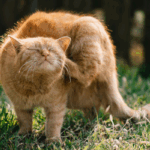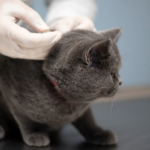When it comes to pets and their behaviour, we like to refer to the saying, “there’s no such thing as bad behaviour, only normal behaviour in an inappropriate setting”.
Put simply, what you may perceive as your pet’s “bad behaviour” is, in most cases, a normal response to a situation. The problem is, it’s just not desirable behaviour from your point of view! For some pets, “bad behaviour” may even be a symptom of something else such as a medical problem or pain.
When it comes to dealing with your pet’s behaviour, we are always the best people to talk to. We will arrange a behavioural consultation with you and your pet to help exclude any medical issues. We will be able to put together a plan for your pet and make recommendations to help deal with inappropriate behaviour.
Here are just a couple of the more common behavioural problems we discuss with our clients on a daily basis:
Dogs and barking
It’s important to understand that barking is the normal way dogs communicate. A barking dog can be helpful and comforting especially when it comes to alerting you about possible intruders. Unfortunately, excessive barking can also be frustrating and disruptive to you and your neighbours.
Common reasons for barking include:
- Warning or alert
- Excitement
- Playfulness
- Attention-seeking
- Anxiety
- Boredom
- Responding to other dogs or people
In some cases, it may be necessary to change your dog’s environment. For example, if your dog always barks at people walking past the front gate, you might need to restrict your dog’s access to the front of the house.
Teaching your dog to bark on command can also help. You can also teach your dog to be quiet on command during this process. Ask us for more information and instructions on how best to do this. Dedication and persistence will be required!
Cats and urine spraying
Urine spraying is a unique activity where a cat stands with their tail in the air and delivers a squirt of urine against a vertical surface.
Why do cats spray urine?
Urine spraying is a normal cat behaviour and is considered a form of scent-marking. The urine spray holds information about sex, age, hormones and general health. Both male and female cats will spray and those who are not desexed may spray more often.
Cats will also spray when they are upset or feel threatened by another cat to deter the other cats from coming into their territory, giving them a greater sense of security.
Cats are fastidious creatures and sometimes simple changes to their routine may also leave them feeling frustrated, unsettled and more likely to spray.
Thankfully, we have tools available to help reduce your cat’s anxiety and urine spraying, such as medication and the use of a pheromone diffuser. Ask us for more information and advice, as we are always here to help.
If you have a question about your pet’s behaviour, we are the best people to ask!






